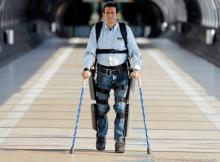News

The Food and Drug Administration has cleared the marketing of the ReWalk Personal System, thereby for the first time enabling individuals with lower-body paralysis because of a spinal cord injury to use a wearable motorized exoskeleton at home.
The robotic device consists of a fitted, metal brace worn over the legs and part of the upper body and is controlled by a wireless remote. It accommodates individuals with heights from 5’3" to 6’3" and weighs up to 220 pounds.
 Courtesy ReWalk Robotics/Argo Medical Technologies
Courtesy ReWalk Robotics/Argo Medical Technologies
The ReWalk Personal System consists of motors that help with movement of hips, knees, and ankles. Its computer and power supply are contained in a backpack. Patients use crutches, and they control the device with a wireless remote control worn on the wrist.
ReWalk costs $69,500 and is currently not covered by insurance, although company officials are in talks with insurance companies, according to a spokesperson. The company also says that the potential medical benefits of using the device will offset the cost by reducing hospitalization and some medications.
ReWalk Personal System is not the only motorized exoskeleton available in the United States, but so far, ReWalk, along with similar (but different) exoskeleton systems such as Ekso Bionics, have been mainly used in rehabilitation facilities and Veterans Affairs hospitals.
"Innovative devices such as ReWalk go a long way towards helping individuals with spinal cord injuries gain some mobility," Christy Foreman, director of the Office of Device Evaluation at the FDA’s Center for Devices and Radiological Health, said in a written statement. "Along with physical therapy, training, and assistance from a caregiver, these individuals may be able to use these devices to walk again in their homes and in their communities."
Individuals with paraplegia due to spinal cord injuries at level T7 (seventh thoracic vertebra) to L5 (fifth lumbar vertebra), can use the device when accompanied by a specially trained caregiver, according to the FDA.
People with spinal cord injury at levels T4 (fourth thoracic vertebra) to T6 (sixth thoracic vertebra) can also use the device, but only in rehab facilities, according to the FDA. The device is not for sports or climbing stairs.
Consumers and their caregivers, who could be a spouse or home health aid, must successfully complete a training program designed by ReWalk at a rehabilitation center or a VA hospital. Physicians evaluate the individual’s skill level based on training before writing a prescription for the device.
But, according to the FDA, prior to being trained to use ReWalk:
• Patients should be able to stand using an assistive standing device (e.g., standing frame), and their hands and shoulders should be able to support crutches or a walker.
• Patients should not use the device if they have a history of severe neurologic injuries other than spinal cord injury, or have severe spasticity, significant contractures, unstable spine, unhealed limb fractures, or pelvic fractures.
• Patients should also not use the device if they have severe concurrent medical diseases such as infection, circulatory conditions, heart or lung conditions, or pressure sores.
The ReWalk Personal System consists of motors that help with movement of hips, knees, and ankles, enabling people to sit, stand, turn and walk, with assistance from a trained person. The device has a tilt sensor, and its computer and power supply are contained in a backpack. Patients use crutches, and they control the device with a wireless remote control worn on the wrist. The device weighs 46 pounds, but the user feels mostly the weight of the backpack, which is about 5 pounds, according to the company.
"The person walks the system, the system does not walk them," Dr. Amit Goffer, the Israeli inventor of ReWalk who became quadriplegic after an ATV accident in 1997, said in a company news release. "The users are in control – when they want to sit, they sit, when then want to stand and walk, they do so."
The device, manufactured by Argo Medical Technologies, has been in use in Europe, Israel, and other countries. The rehab version of ReWalk became available internationally in 2011, while sales of the personal system began in 2012.
It is not clear when another brand of exoskeletons will be cleared for marketing by the FDA. "We’re excited that the FDA has opened this gateway and look forward to seeing how the market reacts," said a spokesperson for Ekso Bionics, noting that the company is currently focused on the rehabilitation market, but some individuals use the device at home with a physical therapist and in clinical studies conducted by the company.

